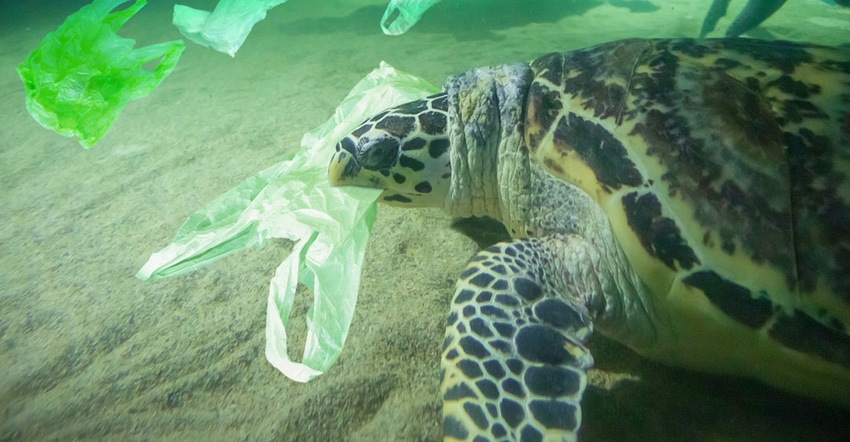While innovations and advancements in the waste and recycling industry are redirecting resources and molding supply chains into circular models, nations around the world are working together on a unified solution to marine plastic pollution.

Perform a Google Image search for ocean plastics. The results are thousands of photos from across the globe of disrupted ecosystems, dwindling species populations and polluted beaches.
While innovations and advancements in the waste and recycling industry are redirecting resources and molding supply chains into circular models, nations around the world are working together on a unified solution to marine plastic pollution.
The UN Environment Assembly (UNEA), the world's highest environmental authority, convened in Nairobi on March 2, 2022 to endorse a resolution aimed at "full lifecycle of plastic, including its production, design and disposal." Officials from more than 175 nations signed the document which will be the catalyst for an international legally binding agreement to be drafted by 2024.
“Against the backdrop of geopolitical turmoil, the UN Environment Assembly shows multilateral cooperation at its best,” said Espen Barth Eide, UNEA-5 president, Norway’s Minister for Climate and the Environment, about the development. “Plastic pollution has grown into an epidemic."
The resolution lays out the backbone for an Intergovernmental Negotiating Committee (INC) that will begin efforts to draft a global legally binding agreement to be completed by 2024. It will "address the full lifecycle of plastics, the design of reusable and recyclable products and materials, and the need for enhanced international collaboration to facilitate access to technology, capacity building and scientific and technical cooperation."
UNEP will host another forum at the end of 2022 to coincide with the first INC gathering in an effort to exchange knowledge and best practices. The group stated that it will encourage open discussions "informed by science" and provide progress reports as the process moves along.
Inger Andersen, executive director, UNEP, added: “Let it be clear that the INC’s mandate does not grant any stakeholder a two-year pause. In parallel to negotiations over an international binding agreement, UNEP will work with any willing government and business across the value chain to shift away from single-use plastics, as well as to mobilize private finance and remove barriers to investments in research and in a new circular economy."
Delegates applauded the collaborative efforts made to begin the process of curating a standardized agreement.
“The world has come together act against plastic pollution – a serious threat to our planet. International partnerships will be crucial in tackling a problem that affects all of us, and the progress made at UNEA reflects this spirit of collaboration,” said Dr. Jeanne d’Arc Mujawamariya, Rwanda's Minister of Environment, in a statement. “We look forward to working with the INC and are optimistic about the opportunity to create a legally binding treaty as a framework for national ambition-setting, monitoring, investment and knowledge transfer to end plastic pollution.”
Don't Waste Time
The waste and recycling industry applauded the outcome of the UNEA-5 gathering, highlighting its own contributions to solving plastic pollution.
In a separate meeting, representatives from the Solid Waste Association of North America (SWANA) urged U.S. officials to place its focus on countries with lesser-developed waste and recycling infrastructure.
“The UNEA resolution is an important first step towards an international treaty, but it is only one step towards reducing the amount of plastic waste flowing into waterways throughout the world," said David Biderman, SWANA executive director and CEO.
The National Waste & Recycling Association (NWRA) stated that it supports unilateral efforts to reduce marine plastic pollution and that will review any subsequent documents that are published as a result of the resolution and committee meetings.
For UBQ Materials, an Israel-based cleantech firm that converts unsorted household waste into a bio-based thermoplastic composite, the resolution is encouraging.
"Pursuing a binding international treaty on plastic pollution is historic and a huge step forward for Mother Nature and humanity alike," said Rachel Barr, VP Sustainability, UBQ Materials. "We’ve already seen many laudable initiatives to stem the leakage of plastic waste into the environment on the local, national, and regional levels, but this piecemeal approach isn’t sufficient, resulting in the problem of ocean plastics. Plastic waste can travel around the world due to ocean currents, and microplastics have even been found in the most isolated, pristine environments. As with greenhouse gas emissions, local plastic pollution is a global problem."
Barr specifically referred to the UNEA's top-down approach to tackling plastic pollution, saying that the "plastic world" has been waiting a comprehensive approach on the global materials crisis and that there's "no time to lose."
Plastic Production to Double
The resolution comes at a time where plastic production and a circular economy make their way into global conversations.
An estimated 11 million tonnes of plastic waste enter the world's oceans each year. This is expected to triple by 2040. Production of the material escalates from 2 million tonnes in 1950 to more than 348 million tonnes by 2017. The plastics industry has an estimated global value of $522.6 billion, with capacity anticipated to double by 2040, according to PEW.
Greenhouse gas emissions attributed to plastic production will account for 15 percent of allowed emissions under the goal of limiting global warming to 1.5°C (34.7°F). Creating circular pathways in the supply chain can "reduce marine plastics by more than 80 percent by 2050, reduce virgin plastic production by 55 per cent; save governments US$70 billion by 2040; reduce greenhouse gas emissions by 25 per cent and create 700,000 additional jobs – mainly in the global south," the UNEA stated.
“The resolution will clearly take us towards a future with no plastic pollution, including in the marine environment,” said Tsuyoshi Yamaguchi, Japan’s Environment Minister, in response to the UNEA-5 meeting. “United, we can make it happen. Together, let us go forward as we start the negotiations towards a better future with no plastic pollution.”
About the Author(s)
You May Also Like




